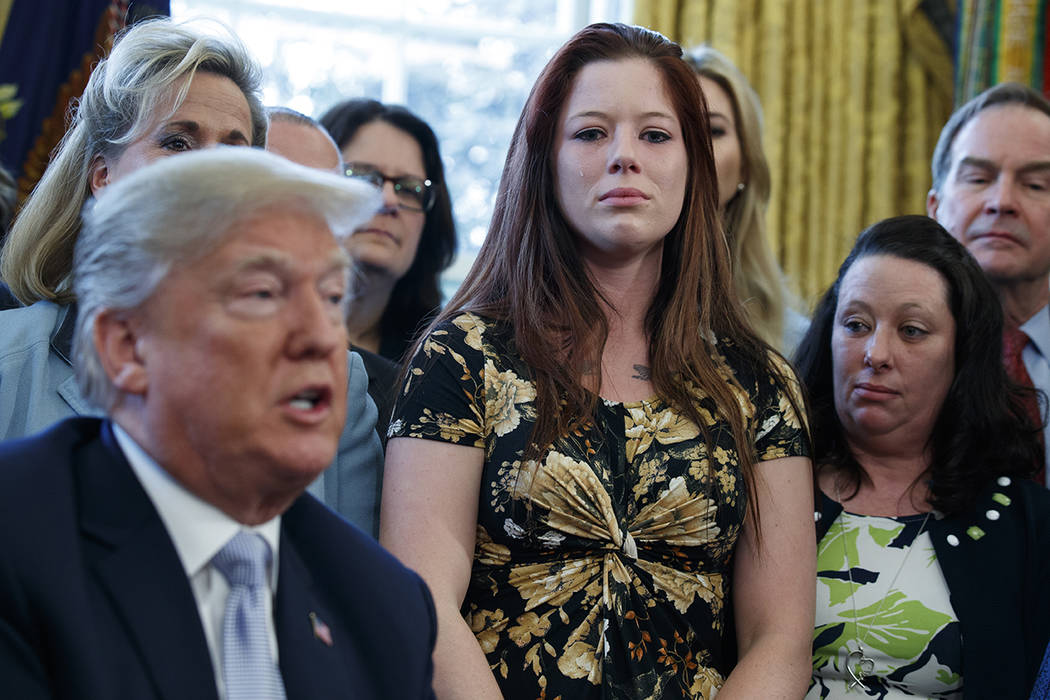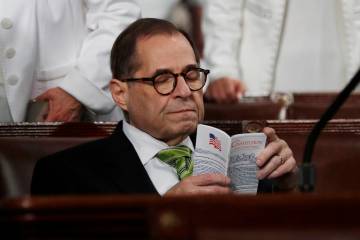Trump signs bill designed to curb online sex trafficking
WASHINGTON — President Donald Trump signed legislation on Wednesday that allows state and local law enforcement officials to prosecute websites that knowingly facilitate prostitution, sexual exploitation of children and illegal sex acts.
Though the Fight Online Sex Trafficking Act came to Trump’s desk with bipartisan support from Congress, the president said the decision to sign the bill was “a tough one,” due to opposition from groups promoting such disparate causes as free speech, technology and sex workers’ rights.
Trump said he that he assumed foes had their reasons to oppose the measure, which he signed at the Resolute Desk in the Oval Office surrounded activists and lawmakers, “but I personally don’t understand those reasons.”
The measure was designed to clarify that the 1996 Communications Decency Act does not shield online websites that profit from sex trafficking and the sexual exploitation of children. It also allows victims and their families to sue platforms that “knowingly” help or promote sex trafficking.
After the signing, Trump gave a pen to Yvonne Ambrose of Chicago. Fighting back tears, she thanked Trump and then related the story of her 16-year-old daughter Desiree Robinson, who was killed on Christmas Eve 2016 after apparently meeting a client who responded to a paid escort ad she had placed.
Likening sex trafficking to “modern-day slavery,” Ambrose recalled, “to get that call on Christmas Eve that your one daughter, your oldest child has been brutally murdered because she said, ‘no’, because she did not want to be a part of this, is the worst thing.”
Ambrose is suing the website, Backpage, for its role in her daughter’s wrongful death.
Last week federal authorities seized and shut the site as part of a broader crackdown on sex trafficking.
“For far too long, Backpage.com existed as the dominant marketplace for illicit commercial sex, a place where sex traffickers frequently advertised children and adults alike,” Attorney General Jeff Sessions announced at the time. “But this illegality stops right now.”
The bill and push to shut sex-trafficking sites appealed to lawmakers across the aisle. In the Senate, the bill passed with 97 yes votes. Both Nevada senators – Republican Dean Heller and Democrat Catherine Cortez-Masto — voted for the measure, as did all four of the Silver State’s House members.
But critics challenged the measure on different grounds.
The Internet Association, which represents many technology industry companies, said in August that the bill was “overly broad” and would “create a new wave of frivolous and unpredictable actions against legitimate companies rather than addressing underlying criminal behavior.” The group switched its position after the House modified the bill’s language on civil damages.
The Electronic Freedom Foundation, a nonprofit devoted to digital rights, said the bill “marks an unprecedented push towards Internet censorship, and does nothing to fight sex traffickers.”
Instead, it said, it “allows for private lawsuits and criminal prosecutions against Internet platforms and websites, based on the actions of their users. Facing huge new liabilities, the law will undoubtedly lead to platforms policing more user speech.”
Groups advocating for the rights of sex workers attacked the legislation from a different direction.
The Women’s March organization, which organized protests in Washington and across the country after Trump won the 2016 election, said it would endanger women engaged in the sex trade by forcing them off the internet.
“The shutting down of #Backpage is an absolute crisis for sex workers who rely on the site to safely get in touch with clients. Sex workers’ rights are women’s rights,” the group said in a recent tweet.
On a paper explaining the group’s guiding principles, the Women’s March claimed “full solidarity with the sex workers’ rights movement. We recognize that exploitation for sex and labor in all forms is a violation of human rights.”
The Sex Workers Outreach Project protested that “closing Backpage increases the vulnerability of the most marginalized among our community as they will have less of an ability to screen clients and advertise their services.”
The crux of the debate on the law hinges on whether one sees prostitution as exploitation or a lifestyle choice.
Barb Brents, a UNLV sociology professor who has studied prostitution for some 20 years, said she has talked to prostitutes who say use of the internet has provided them with safeguards that allow them to screen clients. “It served as a safety mechanism for the vast majority of sex workers, even as it’s also served as a site where criminals can traffic individuals against their will,” said Brents.
It is “highly questionable” the law will “stop sex trafficking,” said Brents. She added, “If we’re really feminists, we would let women decide what they want to do with their own bodies.”
But Sen. Rob Portman, R-Ohio, who sponsored a Senate version of the bill, told MSNBC that the measure was necessary because America is “seeing more sex trafficking than ever. Why? The experts all agree it was because of the online presence. The ruthless efficiency of online trafficking of women and children. And so we had to go here because this is where the problem was.”
At a roundtable in the White House last month, Ivanka Trump, the president’s daughter and assistant, explained that she had adopted the measure because, “the buying and selling of young boys and girls (is) a hidden crime.” Her goal, she said, was to “make sure that modern slavery comes to its long overdue end.”
Contact Debra J. Saunders at dsaunders@reviewjournal.com or 202-662-7391. Follow @DebraJSaunders on Twitter.





























